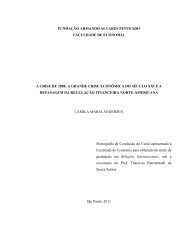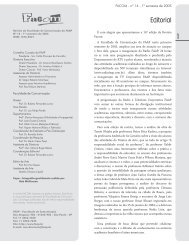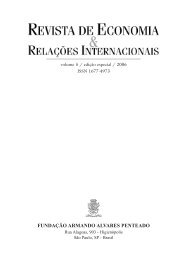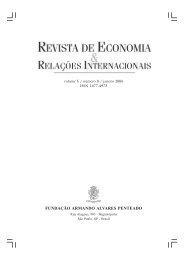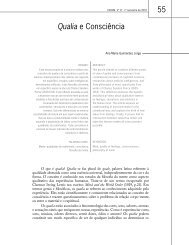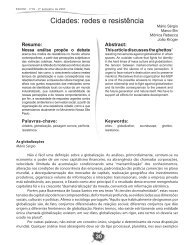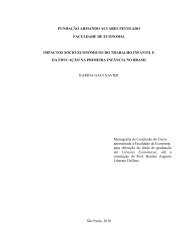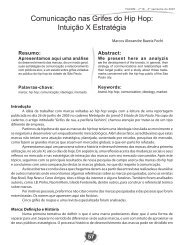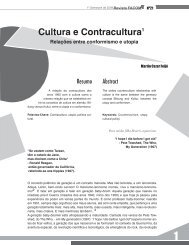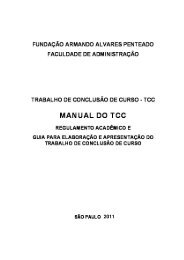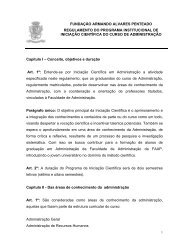Guia de Estudos - Faap
Guia de Estudos - Faap
Guia de Estudos - Faap
You also want an ePaper? Increase the reach of your titles
YUMPU automatically turns print PDFs into web optimized ePapers that Google loves.
the obligation of international cooperation:<br />
[a]ll States should co-operate to strengthen and<br />
continuously improve the efficiency of international<br />
organizations in implementing measures to stimulate<br />
the general economic progress of all countries,<br />
particularly of <strong>de</strong>veloping countries, and therefore<br />
should co- operate to adapt them, when appropriate,<br />
to the changing needs of international economic cooperation<br />
This charter was a clear example of the expectations<br />
of the countries on financial, economic and tra<strong>de</strong><br />
coordination subjects, and where they recognized the<br />
need for a special treatment offered to low-income<br />
countries. As international organisms were created<br />
to attend the <strong>de</strong>veloping countries, UNDP appeared<br />
as an important actor to correspond to these needs,<br />
doing this through specialized techniques, know-how<br />
transfers, best practices exchanges ma<strong>de</strong> throughout<br />
many countries and international cooperation over<br />
projects of technical assistance to highlight socio economics<br />
issues.<br />
Based on this scenery, many other conferences<br />
occurred focusing on these issues, from 1990 until<br />
2000 the MDGs were created, which are targets that<br />
the countries need to pursuit to be met by the year of<br />
2015. When these targets are reached the world will<br />
show itself with a great result in the progress of <strong>de</strong>velopment,<br />
thus raising the quality of life of the world’s<br />
population. And so, cooperation came as a tool to coordinate<br />
financing policies and also to assist setting<br />
policies and programs through international organisms,<br />
which are responsible for offering mechanisms<br />
towards reaching <strong>de</strong>velopment in the least <strong>de</strong>velopment<br />
countries. To get international governance established,<br />
a common i<strong>de</strong>al is nee<strong>de</strong>d, this i<strong>de</strong>al will be<br />
responsible for the union between countries, organizations,<br />
governments, banks, private sector and civil<br />
society; these are nee<strong>de</strong>d to support the global partnership.<br />
When a global partnership is formed, it makes it<br />
easier to regulate the financial market, to offer special<br />
treatment to low-income countries by offering them<br />
lower tariffs and taxes, to offer access to big markets<br />
and privilege to the less <strong>de</strong>veloped countries products,<br />
to facilitate the access to technology and know-how,<br />
etc. An example of great help is found in the health<br />
118<br />
VII Fórum FAAP <strong>de</strong> Discussão Estudantil - 2011<br />
subject once the pharmaceutical industries require large<br />
investment in low-income countries. The rules surrounding<br />
this issue are in agreement among countries, is what<br />
guarantees that the poorest countries will be ai<strong>de</strong>d in this<br />
field.<br />
The eighth target <strong>de</strong>als with the necessity of integration<br />
and regulamentation of markets, giving access to less<br />
<strong>de</strong>veloped countries to provi<strong>de</strong> them the same structures<br />
that <strong>de</strong>veloped countries have, making them able to<br />
reach better levels of economic and social <strong>de</strong>velopment.<br />
All in or<strong>de</strong>r to achieve the other MDGs, the eight target<br />
being the path towards them.<br />
This situation led the international community to<br />
come up with new rules towards the financial system,<br />
where now, banks would go un<strong>de</strong>r regulamentation, and<br />
so would have its freedom shrunk. These rules were settled<br />
in the Basel Accord III in 2010, with the purpose of<br />
avoiding a future crisis in the same proportion of the one<br />
that happened in 2008.<br />
Based on the paragraphs above, we hope to have<br />
ma<strong>de</strong> it clear the importance of global governance. And<br />
to make so, it is nee<strong>de</strong>d regulamentation of markets and<br />
of the system as a whole to avoid even the slightest differences<br />
among countries. By the way the special treatment<br />
to low-income countries has always to be consi<strong>de</strong>red.<br />
OVERVIEwS<br />
Latin America and the Caribbean<br />
The region has had large financial crisis in its history.<br />
Inflation has always been present in the countries of the<br />
region. Brazil and Chile today have safe systems and recovered<br />
well from previous crisis and periods of market<br />
closure. However, the great problems are the income<br />
disparities, both regional and national. The difficulty for<br />
regional integration continues as MERCOSUL still has difficulties<br />
to endure and establish itself <strong>de</strong> facto.<br />
The objective of the 8th MDG in the region is to consolidate<br />
markets, regulate fees and taxes, expand commercial<br />
capacity of countries, and to reduce the <strong>de</strong>pen<strong>de</strong>ncy<br />
on rural products and commodities. Brazil appears as the<br />
lea<strong>de</strong>r in the region, leading South-South cooperation,<br />
through projects and technical cooperation programs<br />
and with its experience to universalize AIDS medications<br />
access.




